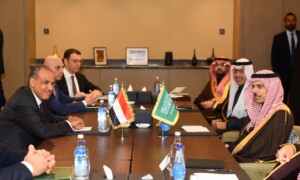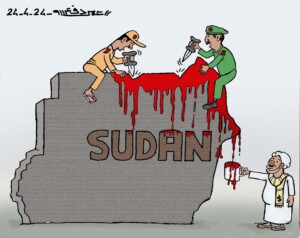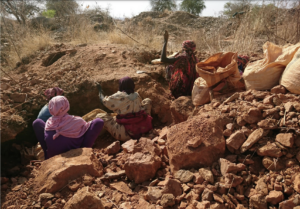Donald Booth: ‘Sanctions relief is a start to address Sudan’s human rights issues’
Over the next three months, the United States decided whether Sudan has made progress on certain areas and 20-year-old economic sanctions should be removed. “The level of trust was at a very low point.”
Over the next three months, the United States decided whether Sudan has made sustainable progress on certain areas and it will remove 20-year-old economic sanctions imposed on Sudan. “Given the level of trust that the US and Sudan were starting from, we needed to have areas where it would be as clear as possible if indeed the agreed objectives were being met.”
The prerequisites for the revoking in July, such as Sudan's ceasing of offensive military activity, were drawn up while Donald Booth was in charge as US Special Envoy to Sudan and South Sudan. More access for humanitarian organisations in Sudan, halting support to the Lord’s Resistance Army (LRA) in Uganda, collaboration in the fight against terrorism, and efforts to achieve peace in South Sudan, are the other four tracks. In the event that Sudan performs to the satisfaction of the US and sanctions are partially removed, Sudanese politicians said that this will improve Sudan's economy by easing cash transfers, investments, importing industrial equipment and ultimately raise the value of the Sudanese Pound.
In an exclusive interview with Radio Dabanga broadcast today, former envoy Booth expresses his view on the plan he worked on. “The five tracks are the beginning of a process, for the mutual confidence that was needed in order to address these very difficult issues of human rights and good governance.”
Continue reading below or listen to the audio clips on SoundCloud
♦
RD: Dear Ambassador Booth, what were your overall expectations when you started as special envoy to Sudan and South Sudan and what are your impressions now, concerning these both countries?
DB: “I left the job in mid-January 2017. When I started, President Obama gave me a clear objective to work towards. That was two countries, Sudan and South Sudan, at peace internally, with each other, and with the region. What I've seen in the past three years, we did manage to bring Sudan closer to peace. South Sudan unfortunately is not any closer to peace, further away actually than when I started. That's a very unfortunate development. We certainly worked very hard with the Intergovernmental Authority on Development (IGAD) region and all South Sudan neighbours to try to put an end to the fighting. We had a peace agreement, which unfortunately the parties refused to implement. And now they're back fighting. The situation in South Sudan is indeed deplorable. The fighting is spreading to different parts of the country that had not been affected in the preceding years. The US and the region need to continue pay attention to this.”
People in Sudan expressed surprise to Radio Dabanga at the plan of the United States to lift economic sanctions on Sudan, seen as a reward for the situation.
“First of all, I would not characterise it as rewards. What we managed to do in 2016 was to initiate a process to achieve change that would benefit the people of Sudan. The level of trust between US and Sudan was at a very low point. So we developed the five tracks plan, to try do begin to develop trust which could lead to positive changes. And the areas that we focused on that are areas that the US has long been focused on: a country at peace with itself. One of these tracks was to end offensive military operations, in part including areal bombardment, which has been so horrific and harming innocent Sudanese. In achieving greater access of humanitarian assistance so that those Sudanese who need those humanitarian aid could be reached.”
“It was also, frankly, a way to address and improve what had been tense relations between Sudan and Uganda.”
Recently Uganda and the US have ended a six-year search for warlord Joseph Kony and his LRA, because Kony apparently no longer leads his men and the threat to the region has diminished. Is helping to reduce support to the LRA included in the five conditions for Sudan because in fact, Kony is no threat to the region anymore?
“No, not at all. The LRA and Kony killed and enslaved thousands of people throughout the region, and certainly terrorized people in the region. Removing him as a threat to the region was a priority for the [former US president] Obama administration. It was also, frankly, a way to address and improve what had been tense relations between Sudan and Uganda. So, in getting Sudan to cooperate fully in the efforts to remove Joseph Kony and the LRA as a threat to the region, we believed would be an important contribution to regional peace and stability.”
Do you feel there is progress in the relations between Sudan and Uganda?
“I know that during the period that I was envoy, there were, for the first time in a long time, there were high-level meetings between the leaderships of the two countries. And so that discussion, getting underway in itself, I think was positive. How that has continued now, I'm not in the position to know any details of.”
“We had to pick areas in which we could both measure and achieve progress.”
One of the things human rights organisations, activists and observers felt was missing in the five track plan was a condition or discussion on human rights, religious freedom issues and basic good governance in Sudan.
“Frankly, ending aerial bombardment, barrel bombs being dropped on civilian targets, and offensive military operations that displaced and killed and wounded civilians, we believe are a major human rights offence. So if you want to talk about protecting human rights, the basic right is that of life. We felt that that focus of the five track plan had very much a human rights component to it. Secondly, the five tracks are the beginning of a process, for the mutual confidence that was needed in order to address these very difficult issues of human rights and good governance.
“And third, we had to pick areas in which we could both measure and achieve progress. Given the level of trust that we were starting from, we needed to have areas where it would be as clear as possible if indeed the agreed benchmarks were met. So that we would be able to have a very clear and mutual understanding. And we would not have – what happened in the past – where expectations had not been met as both sides had different interpretations of what would be done.
“So I think we succeeded in this with the five track plan, in building that confidence that Sudan does take certain hard measures, like ending military actions against its own people – offensive military actions. That there will indeed be a response from the US, and that the US will keep its word in that regard.”
“We had regular consultations with the UN, international NGOs. We took all reports that related to potential violations of conditions of the five track plan very serious.”
How did the US government determine in 2016 that the situation in Sudan was suitable for a review of the five criteria for the possible lifting of economic sanctions, and how did you find whether Khartoum failed its commitment concerning the five tracks? 
“There were very clear benchmarks. The US, during the period of the five track plan's implementation at the end of my time as envoy, was very carefully monitored. We had regular consultations with the UN, international NGOs. We took all reports that related to potential violations of conditions of the five track plan very serious. We investigated them to the fullest extent possible. We held bi-monthly meetings between the US government and the Sudanese government, to make sure that if there were problems, that they were corrected. In a monthly basis we met at ministerial level with the Sudanese government, to work out where there were any issues in the implementation.
“So, for example, the ability to monitor whether there was support to armed opposition in South Sudan, was very clear if it were happening or were not happening. This is true in all of the areas, with the possible exception of humanitarian access. Here we recognized all along that there would be no on/off switch. We would not go from a system where there were a lot of restrictions to one which had complete openness. But what we saw over the course of the six months, of the five track plan, was a continued improvement, reported by those on the ground as we engaged the government in that part of the five track plan.”
Radio Dabanga has reported on military activities and aerial bombardments by Sudan that violate the conditions for the lifting of sanctions. US Congressmen, NGOs, and groups in Sudan voiced their concerns or held protests against your plan. What do you think the US will do in case of failure by Sudan?
“The monitoring by the US Government is ongoing, and in July this year, the US Secretary of State will report on compliance on the five track plan. The unlimited replication of the sanctions' executive orders – and those sanctions that had the broadest impact on the people of Sudan – will depend on that report. I certainly hope that the Government of Sudan will honour its commitment to the five track plan so that those reports can be positive. And the sanctions executive orders can be lifted.”
“The National Dialogue has certainly been too narrow […] We worked for months to convince the opposition that it, too, needed to engage and sign the Peace Roadmap Agreement.”
The ruling National Congress Party and President Omar Al Bashir say that they have started change in Sudan with their National Dialogue. Do you feel that too?
“There has been a dialogue but today it's certainly been too narrow. One of the things that I did as envoy was to continue to urge the GoS to keep the process open and to make it inclusive, as they promised to do in the March 2016 Roadmap Agreement that it signed. This is the agreement [African Union Chief Mediator Thabo] Mbeki had negotiated, and the roadmap which initially the armed opposition and others refused to adhere to. The US and the Troika and European partners worked for months to convince the opposition that it, too, needed to engage, and sign the Roadmap, and begin the process of addressing the substantive issues rather than just procedural issues. The National Dialogue will hopefully remain open and can be made inclusive.”
There are various sanctions imposed on Sudan, regarding the Darfur Peace and Accountability Act (2006), which President Bush signed to block the property and transactions with designated individuals and entities associated with Sudan’s government, the executive order, and the branding of a state sponsor of terrorism. Which one is prioritised if Sudan fulfills its obligations and commitments by July?
“What President Obama did with his executive order in January this year, was to suspend two executive orders: 13067 and 13412. And these – if the report, to be done in July, shows that the Government of Sudan has continued to adhere to its commitments – would be indefinitely lifted. […] But there are other sanctions and restrictions in place. One certainly has to do with individual sanctions, those persons' sanctions by the UN, which have been implemented under another executive order. As well as the restrictions and sanctions that stand from the 'state sponsor of terrorism' designation, and various other designations and US laws, including the Darfur Peace Accountability Act.”
“I think we need to get to a mutually beneficial trade commitment.”
Did US trade missions to Sudan, consisting of ICT and consumer goods companies, take place during your time as special envoy?
“I did not lead any trade missions to Sudan during my time as special envoy. Clearly I think the lifting of the sanctions […] would open the door for much greater participation by US companies in Sudan, and by Sudanese companies dealing with the US as well. I hope that that will happen – I think we need to get to a mutually beneficial trade commitment.”
If you have a special message for the Sudanese people, please share it with us.
“I think what the people of Sudan want… To have security, to be left alone, to work their land, to live their lives, and educate their children. And so, when I heard that the Government of Sudan took those measures to restore peace and stability, to protect all Sudanese, and to enable them to get on with rebuilding their lives – enabling refugees and displaced people to return home – this requires first and foremost the end of fighting and the establishment of internal security. […] I urge the armed opposition to also cooperate in that, simply refusing to talk is not a way that will help the people of Darfur and people of Sudan.
“I wish the people of Sudan all the best. I hope peace and stability will come, and they indeed will be able to building their lives, educating their children and moving forward to their country.”
♦
|
20 years According to experts, the sanctions have significantly contributed to the rise in the black market exchange rate which resulted in the scarcity of hard currency in Sudan. These were imposed by Washington in November 1997 by executive order after it accused Sudan of being a 'state sponsor of terrorism'. The action has blocked all Sudanese government assets in the US and barred all trade – later, medical and agricultural exports were exempted – as well as transactions involving persons in Sudan. This happened a year after President Bill Clinton signed the Anti-Terrorism and Effective Death Penalty Act, which banned Americans from engaging in any financial transactions with governments such as Sudan's which were on the US list of terrorism sponsors. The branding of Sudan as a sponsor of terrorism will remain, the US decided, while drawing up the criteria for partially lifting the sanctions in the end of 2016. |











 and then
and then